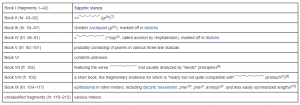The Greek Text & Commentary (Old)
1 Leave a comment on paragraph 1 0 The Digital Sappho gathers in one place various resources for translating and conducting research on the works attributed to Sappho. It is inspired by, and deeply indebted to, William Annis’ excellent commentary at Aoidoi.org, expanding his original six commentaries to include the entire Sapphic corpus. The Greek text comes from the most recent editions available. Primarily these are Campbell 1982 and Voigt 1971, but includes Obbink’s newest editions of ff. 26, 58, and the Brothers. My principal sources are:
Annis, William A. “Sappho.” Aoidoi.org. 2002 – 2007.
Campbell, David A., ed. 1982. Greek Lyric: Sappho and Alcaeus. Vol. I. Loeb Classical Library 142. Cambridge: Harvard University Press.
Lobel, Edgar, and Denys Lionel Page. 1955. Poetarum Lesbiorum fragmenta. Oxford: Clarendon Press.
Obbink, Dirk. 2010. “Sappho Fragment 58-59: Text, Apparatus Criticus, and Translation.” In The New Sappho on Old Age: Textual and Philosophical Issues. Hellenic Studies 38. Washington, DC and Cambridge: Harvard University Press.
Obbink, Dirk. 2014. “Two New Poems by Sappho.” Zeitschrift Für Papyrologie Und Epigraphik 189: 32–49.
Page, Denys Lionel. 1955. Sappho and Alcaeus: An Introduction to the Study of Ancient Lesbian Poetry. Oxford: Clarendon Press.
Voigt, Eva-Maria, ed. 1971. Sappho et Alcaeus. Amsterdam: Polak & Van Gennep.
9 Leave a comment on paragraph 9 0 My goal is to aid the student translator as much as possible. I’ve accepted reconstructions from multiple editors to fill out the text as much as possible. I’ve moved final iotas to iota subscripts in service of more easily identifying the grammatical form; I’ve added quotation marks to indicate direct speech; and I’ve changed lunate sigmas (Ϲ) to σ and ς, except in fragments where it’s impossible to tell which.
10 Leave a comment on paragraph 10 0 Each poem is accompanied with vocabulary assistance, with links to the LSJ (Liddell and Scott, A Greek-English Lexicon) on Perseus. As a general rule I’ve followed the lexical convention for indicating feming nouns (ἡ) and adjectives (-η), even though Aeolic uses (ἀ) and (-α). Wherever this might be confusing, however, I give the Aeolic form or both. Otherwise I maintain the Aeolic word form and indicate the Attic through the note or the link to LSJ.
11 Leave a comment on paragraph 11 0 The Alexandrian library had nine books (scrolls) of songs attributed to Sappho. They were arranged by meter:
12
Leave a comment on paragraph 12 0
 “Aeolic Verse,” Wikipedia: https://en.wikipedia.org/wiki/Aeolic_verse
“Aeolic Verse,” Wikipedia: https://en.wikipedia.org/wiki/Aeolic_verse

Creative Commons
This work is licensed under a Creative Commons Attribution-ShareAlike 4.0 International License.